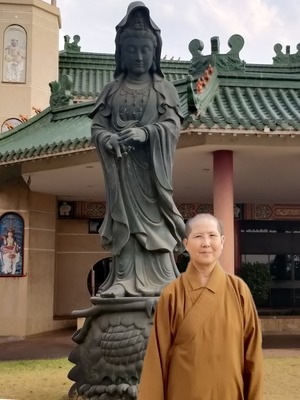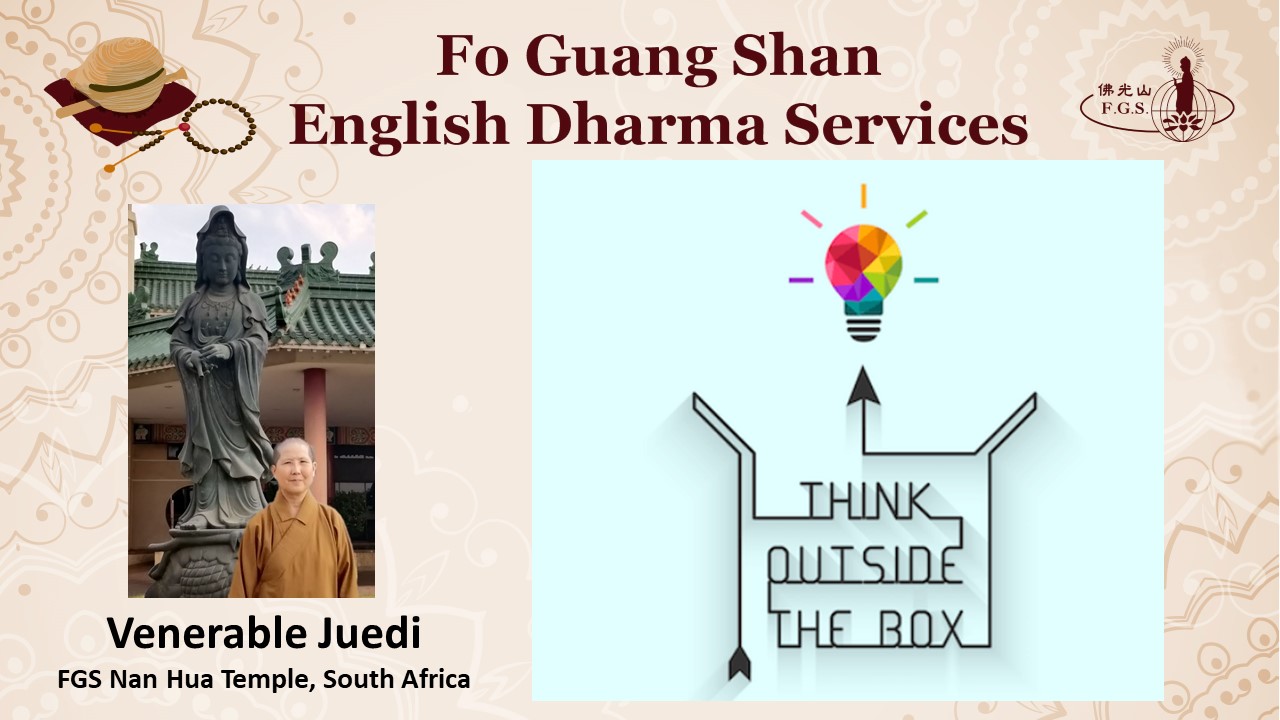
Speaker: Ven. Juedi
Fo Guang Shan Nanhua Temple, South Africa
I. Introduction
Auspicious greetings to everyone. Welcome to our Fo Guang Shan English Dharma Service Channel. I am Juedi from Nan Hua Temple in South Africa. Today I will cover the topic of “Thinking Outside the box.” You can find this article from the third volume of Buddha-Dharma: Pure and Simple by Venerable Master Hsing Yun.
I find this topic quite interesting, because this is thinking outside the box with a dose of the Dharma. So let us start with a small little game. Can you find the letter M? Do you manage to find it? Some found it at the bottom right hand corner. But look again. It is not a letter M. Half of it was being cut off. Yes, some of you might have noticed the letter M in white on the top box.
This picture misleads us when we stick to our usual way of thinking. This is similar to our everyday life. We are searching for happiness, but we either search in the wrong direction, or treat pseudo happiness as true happiness. When we are willing to think outside the box, then it may not be so difficult to look for happiness.
II. To Laugh or To Cry
Here is an example of a crying old lady. Once there was a lady who cried every day, so people gave her a nickname: the crying, old lady. One day a wise man passed by and overheard this old lady crying. He approached her and asked,
“My dear old lady, why are you crying? Can I help you?”
The old idea replied, Oh, you will never be able to help me. So many people come to me and want to offer their help. But none of them was able to.”
The wise men gently said, “Please, tell me your problem. Maybe I can help you.”
The old lady then said, “I have two daughters. My elder daughter is married to an umbrella seller, the second is married to a noodle seller. On sunny days, I worry about my elder daughter because her umbrella business is bad. On rainy days, I worry about my second daughter, because she cannot put the flour under the sun to dry to make noodles. Therefore, I cry every day.
The wise man smiled at the old lady and said, “I have a way to solve your problem. On sunny days, think only of your second daughter, who can put the flour under the sun. On rainy days, think only of your elder daughter who sells umbrellas.”
The old lady followed his suggestion. From then on, every day is a happy day for the old lady. Her neighbors now call her the smiling old lady.
There are many circumstances in life whereby we can change our external conditions. In the above example, we cannot change the weather, However, we can and change our mindset. Try to think outside the box, and life will not be as miserable as we think.
III. Interpersonal Conflicts
Do we think the right thing at the correct time or the incorrect time? Before we listen to the way suggested by Venerable Master Hsing Yun on how to think outside of the box, I will first introduce some key Buddies concepts. These key concepts help us understand the reasons behind interpersonal conflicts.
We encounter these 3 types of dissatisfactions in our life.
- Encountering what is unpleasant
- Separation from what is pleasant
- Not getting what one wants.
When these three happen, they can cause conflict among people.
For example, in Southeast Asia there is a popular fruit called durian. Most people in Southeast Asia love durians. However, some dislike them! Those who love durians will enjoy the fragrance and soft texture of the durian flesh. But those who disliked durian will say it is stinky. Like the proverb says, one man’s meat is another man’s poison. Hence, this is when conflicts come about. If we understand that every one of us is encountering these three types of dissatisfaction in life, then we learn to be more embracing and tolerant of others’ actions. With these concepts, we first established: this is how we feel, and next we get to see how others feel.
The following are the four suggestions by Venerable Master Hsing Yun.
- Allow others to be right and be willing to be wrong.
- Allow others to be great and be willing to be small.
- Allow others to have and be willing to go without.
- Allow others to be happy and be willing to suffer.
You might have noticed by now that this seems to be like putting others in the first place, and ourselves the second. However, going one step backward is moving one step forward. Let’s go into the first example about right and wrong.
IV. Allow Others to be Right and Be Willing to Be Wrong
Donald asked Daisy, “Why is it that our family always argues and is unable to enjoy a single moment of peace? Why is your family always harmonious and never seems to quarrel?
Daisy said, “That’s because your family is always right, and my family is always wrong. If someone in your family breaks a cup they wouldn’t think it’s their fault. Instead they would immediately blame others for displacing the cup, to which the others would reply, you are the one who is careless and broke the cup. This is why the argument never stops. My family is the exact opposite. Everyone openly admit their errors. The person who broke the cup would immediately own up to the mistake, and the other person would also apologize for misplacing the cup. Since my family admit they are in the wrong, naturally we enjoy a harmonious relationship.”
By allowing others to right and be willing to be wrong, Daisy’s family is open to making mistakes and creating a more embracing family. In the workplace. Sometimes, instead of scolding a person for not doing work properly, we may apologize and say, “Oh, maybe I have not made myself clear. Hence you interpreted wrongly and did it the wrong way. I shall explain again.” After explaining, you can ask him, “What do you think is the right way of doing it?” This will encourage better communication between each other. When you take one step back, and admit that it’s your mistake. Sometimes people are more willing to open up, and admit they are wrong.
V. Allow Others to be Great and Be Willing to Be Small
The second one is to allow others to be great and be willing to be small. A person gains the respect of others through virtue and an honorable reputation, not by conceit and vanity. In Buddhism, there is a bodhisattva named Never Disparaging. To all who look down upon him, the bodhisattva would reply, I dare not belittle any of you, for you are all future Buddhas.” By having this mentality of allowing others to be great, and the willingness to be small, naturally, there will be no dispute. Our ego prevents us from being humble and seeing others as future Buddhas. Let’s continue with our story of Donald. Donald is a very efficient and effective person. He takes pride in being one. So whenever in the office, when people criticize his performance, he gets mad at them. Sometimes, all these accusations may not be true. But the reality is that false accusations happen. This is the first key concept that I mentioned earlier on, that is, encountering what is unpleasant. Despite encountering unpleasant situations, the Never Disparaging Bodhisattva allows others to be great and be willing to be small. People who think of themselves as insignificant are not necessarily so. For the most admirable people are those who are patient, tolerant, and magnanimous. When we gradually learn to put aside our ego, we are in better control of our happiness.
VI. Allow Others to Have and Be Willing to Go Without
The third one is to allow others to have and be willing to go without. Most people hope to have more than others and cannot bear to do without. However, being the only person to have something that nobody else has might incite jealousy and bitterness. How could that possibly be happy? In many countries when income inequality is high, stealing and robbery become very common. When crime increases, ultimately, nobody gets anything. To go without does not mean that there is nothing. It means to be without limits, without measure, without exhaustibility, and without bounds. In contrast, having something also means having limits, having measure, having ends, and having bounds. If people truly understand the concept of emptiness, they are as free as the sky, because the sky is free from boundaries and limits. It can embrace the clouds, the birds, and tall buildings. But for material things, there is a limit. How many meals can you eat in a day? How many luxury cars can you drive in a day? No matter how rich you are, all of us are equally given 24 hours a day to spend, so we have to go beyond shapes and forms. If you look at this particular picture, you see a rock. There’s a hole inside it. If this rock is not in this form, do you think it will attract a lot of attention? Imperfection turns up to be beauty. We realize that the things that are more valuable in life are without shape and form. Value is not determined by some things’ appearance, but by how much it has meaning.
VII. Allow Others to Be Happy and Be Willing to Suffer
The fourth one is to allow others to be happy and be willing to suffer. Seeking personal comfort and happiness at the expense of other people is the basis of worldly disputes. On the surface, those who give happiness to others may appear to be in a position of disadvantage. But in actuality, they are the ones who benefit. If we look at the world, there are numerous people who withstand the test of time like evergreen trees because of their ability to endure hardship. Conversely, shortsighted people who indulged in laxity, looking for quick fixes are eliminated by the test of time because of their inability to handle changes that come their way. When we look at history, those people who improve the livelihood of others are being remembered. For example, the invention of the light bulb created convenience for every one of us. The process of the invention involves a lot of hardship. On the other hand, when we think only of our happiness, there are sibling rivalries, office politics, countries going into wars, and all the people suffer together. To be harmonious in interpersonal relationships, it is crucial to keep in mind these four points. By doing so, even with differing opinions or methods of doing things, people will still be able to coexist in harmony and peace.
May you find joy in the Dharma!

